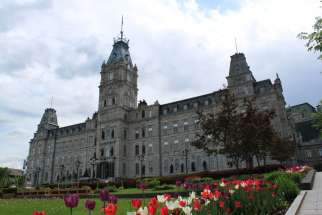Bill 21 ruling headed to Quebec Court of Appeal
OTTAWA - Two organizations trying to have Quebec’s secularism law Bill 21 — which bans public sector workers from wearing religious symbols at work — overturned by the courts will be joining the provincial government in appealing an April 20 court decision that upheld most of the controversial law.
Quebec appeals court rules euthanasia can proceed — for now
MONTREAL - Euthanasia is now technically legal in Quebec following a Dec. 9 decision of the Quebec Court of Appeal. But whether that remains permanent is still a matter before the courts.
Supreme Court to hear prostitution appeal
OTTAWA - The Supreme Court of Canada has agreed to hear an appeal of an Ontario Court of Appeal ruling that upheld most of a lower court’s decision to strike down some of Canada’s prostitution laws.
The federal government had applied for leave to appeal to the Supreme Court in late May.
Prostitution is not illegal in Canada, but activities surrounding it are: soliciting for the purposes of prostitution, running a brothel or bawdy house and living off the avails of prostitution or pimping.
But in a landmark ruling March 26, the Ontario Court of Appeal rendered a decision that legalizes brothels and allows prostitutes to hire protection and other staff. Public solicitation and pimping remain illegal but the court ruled that prostitutes have a constitutional right to work in safe environments such as an organized brothel.
However, the Ontario court suspended implementation of its decision for one year to give Parliament time to amend the criminal code.
The Catholic Civil Rights League welcomed news of the appeal.
“With our partners REAL Women of Canada and Christian Legal Fellowship, we have been intervenors in this case from its beginning in Ontario Superior Court,” said league executive director Joanne McGarry.
“Our position was and remains that while the law is not perfect, any liberalization of it would not improve prostitutes’ safety, and would make it easier to lure and exploit vulnerable girls and women
“Evidence from other jurisdictions suggests that when legalization occurs, the illegal side of the business continues to flourish,” she said in a statement.
REAL Women of Canada national vice president Gwendolyn Landolt says she and the other two groups expect to file their intention to intervene by next April.
Landolt said REAL Women would like to see prostitution itself prohibited.
“We do want to see that women who are prostitutes have an option to get off the streets, into safe houses and to receive treatment,” said Landolt, who noted many have problems with alcohol or drugs and sell sex to maintain their addictions.
“They need help. You don’t encourage them by widening the law.”
She said cases where prostitution laws have been loosened have not brought more safe conditions for prostitutes.
“Brothels do not protect women,” she said. “In the Netherlands, one-third of brothels had to be shut down because the criminal element became involved.
“Prostitution is inherently dangerous, no matter what circumstances are involved.”
Landolt warned about the consequences to women and children who are being trafficked into, out of or across Canada into the sex trade. Canada is already a transit country for traffickers bringing sex slaves into the United States, she said. Aboriginal women and children are especially vulnerable to trafficking.
“Human trafficking is one of the most lucrative criminal undertakings in the world,” she said, along with the sale of illegal weapons and the drug trade.




